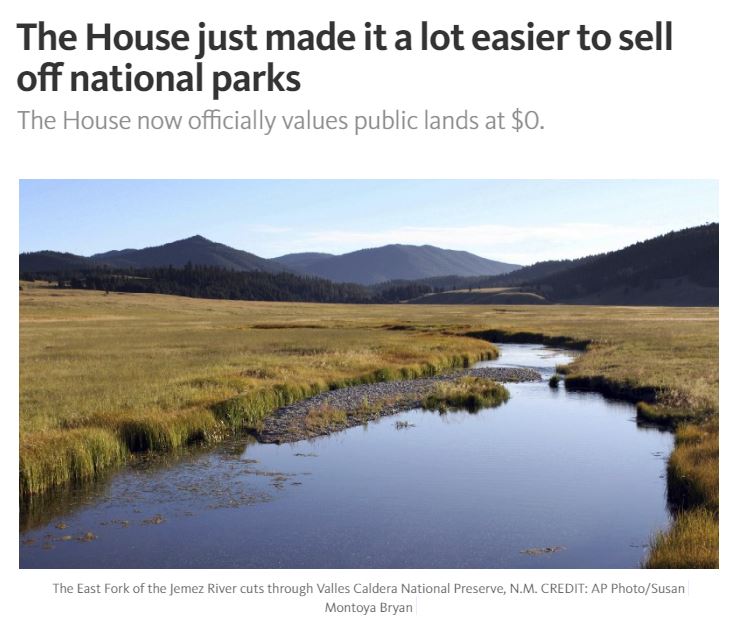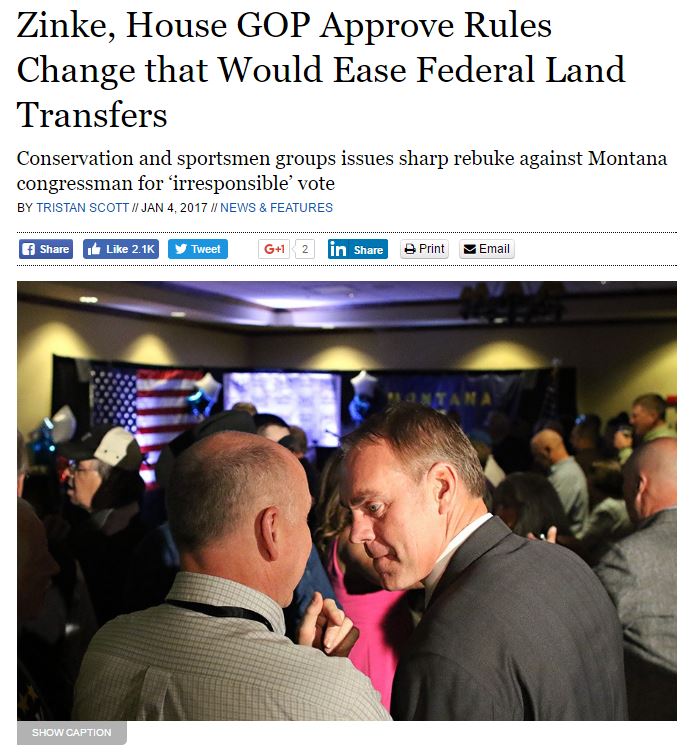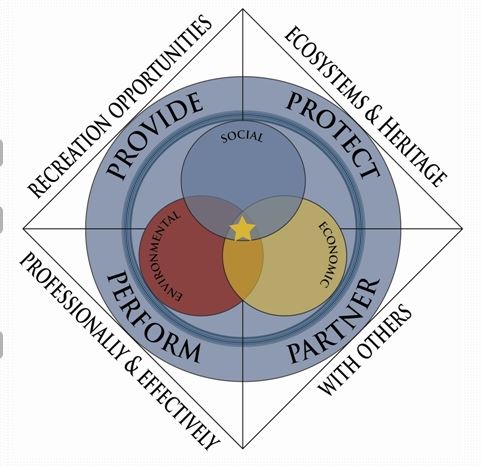
The U.S. House of Representatives just made it easier for the government to sell or give away national parks, national forests, and other public lands.
A new rule, written by House Natural Resources Committee Chairman Rob Bishop (R-UT), establishes as fact that any legislation to dispose of public lands and natural resources would cost taxpayers exactly $0. This paves the way for the new Congress to get rid of vast swaths of public lands — all at the expense of the American taxpayer.
Under Congressional Budget Office accounting rules, the House is required to account for the cost of any legislation it considers. Now, the House does not need to even estimate any financial losses from giving away public land. Bills to dispose of public land will skip several steps in the normal legislative process, coming up for a vote without any discussion of the costs and benefits. The House approved the rules change by a vote of 234 to 193 on Tuesday.
Since the move applies only to House rules, it is not subject to approval by the Senate or a presidential signature. It is effective immediately.
“The House Republican plan to give away America’s public lands for free is outrageous and absurd,” Rep. Raul Grijalva (D-AZ) said in a statement just prior to the vote. “This proposed rule change would make it easier to implement this plan by allowing the Congress to give away every single piece of property we own, for free, and pretend we have lost nothing of any value. Not only is this fiscally irresponsible, but it is also a flagrant attack on places and resources valued and beloved by the American people.”
The procedural shortcut appears to apply equally to all types of public land. For example, national parks from Yellowstone to the Grand Canyon, as well as federal buildings such as the Pentagon, could all be given away without consideration of the cost to American taxpayers.
The idea to dispose of public lands reflects the alliance between anti-government extremists, led by Cliven Bundy, and members of the anti-parks caucus, who don’t acknowledge the federal government’s authority over national public lands. Instead, these groups want to see public lands given to the states. In reality, states would likely be unable to shoulder the burden of managing these lands — from fighting wildfire to cleaning up abandoned mines — and would ultimately sell them to private interests.
The House rules change was met with sharp criticism from conservation and watchdog groups.
“Less than one day in and Congressional Republicans are already greasing the skids to give away or sell off America’s public lands, forests, and wildlife refuges,” Jen Rokala, executive director for the Center for Western Priorities, said in a statement. “What’s worse, politicians are using smoke and mirrors to hide the cost of stealing away our public lands, while ripping off American taxpayers in the process.”
More than 90 percent of voters in Nevada, Colorado, and Montana believe public lands are an essential part of their state’s economy, according to polling by Rokala’s group. In addition, the U.S. Government Accountability Office has found that oil and gas drilling on public lands is one of the federal government’s largest sources of non-tax revenue.
Moreover, the Outdoor Industry Association estimates that outdoor recreation, which largely takes place on public lands, is responsible for a $646-billion industry that supports 6.1 million direct jobs.
As recently as four weeks ago, Congress acknowledged the importance of the outdoor recreation economy. Both the House and Senate unanimously passed the Outdoor Recreation Jobs and Economic Impact Act (the Outdoor REC Act), which directs the Department of Commerce to measure the value of outdoor recreation economy.
But Tuesday’s vote asserts that public lands have absolutely no value to the American public — discounting the very economic driver the Outdoor REC Act aims to measure.
Both President-elect Trump and his Interior Secretary nominee, Rep. Ryan Zinke (R-MT) have been vocal opponents of selling off America’s public lands. Zinke resigned from the GOP platform-writing committee last summer after it included language supporting the disposal of public lands. However, Zinke voted in favor of the rules change that would streamline public land disposal.
It remains unclear where he will stand on this issue if confirmed as Interior Secretary. A date for Zinke’s confirmation hearing has not been set.
House Republicans including Montana U.S. Rep. Ryan Zinke voted Tuesday night to overturn a rule requiring Congress to calculate the value of federal land before transferring it to states or other entities, removing a significant barrier to limit lawmakers from ceding federal control of public lands.
The provision, part of a larger rules package that passed by a vote of 233 to 190, dictates that transfers of federal land should be treated as having no cost to the federal government, therefore requiring no budgetary offset, even if the parcels generate revenue for the U.S. Treasury through logging or energy extraction.
Currently, the Congressional Budget Office provides “scorekeeping” estimates to measure the costs of proposed public land transfers by evaluating the economic impacts of existing uses.
The new rule, introduced by Rep. Rob Bishop, R-Utah, overturns that requirement, stating that “authorizing a conveyance of Federal land to a State, local government, or tribal entity shall not be considered as providing new budget authority, decreasing revenues, increasing mandatory spending, or increasing outlays.”
While the idea of transferring federal public land to the states has figured prominently into the GOP platform because it returns management authority to surrounding communities, opponents caution that states without the resources to manage broad swaths of federal land would be forced to sell it off to developers.
“This proposal is outrageous and absurd,” according to an internal memo circulated to Democratic House members by the Natural Resources Committee and obtained by the Beacon. “This is fiscally irresponsible, not to mention a flagrant attack on places and resources valued and beloved by the American people. This proposal would allow the federal government to give away every single piece of property it owns, for free, and pretend we have lost nothing of any value.”
There are more than 27 million acres of federal land in Montana, encompassing about 29 percent of the state. The Forest Service oversees 17 million acres, mostly in Western Montana.
Zinke, Montana’s lone congressman, was recently tapped by President-elect Donald Trump as the nation’s next Interior Secretary and has opposed transferring management of federal lands to states’ control, even quitting his post as a member of the GOP platform-writing committee after the group included language that would have made transferring federal land ownership to the states a priority.
He characterizes himself as a “Teddy Roosevelt” Republican and made his commitment to preserving America’s public lands a centerpiece in his recent campaign for re-election.
“I was extremely surprised by Ryan Zinke’s vote in support of this rule change,” Brad Brooks of The Wilderness Society said. “This rule greases the skids by removing the biggest obstacle preventing the transfer of public lands. Talk is cheap and votes matter, and this vote really mattered.”
Trump has also stated he opposes the transfer of public lands, telling Field and Stream magazine last year, saying “I don’t like the idea.”
“You don’t know what the state is going to do,” Trump told Field and Stream. “I mean, are they going to sell if they get into a little bit of trouble? And I don’t think it’s something that should be sold.”
It’s no surprise, then, that Zinke’s vote in favor of the new rule prompted immediate backlash from the local conservation and outdoor recreation communities, whose advocates called it an about-face.
“This is an absolute affront to Montana’s way of life and to the millions of Americans who hike, hunt, fish, and camp on public lands,” said Brian Sybert, executive director of Montana Wilderness Association. “It’s especially troubling that Rep. Zinke, a self-proclaimed Roosevelt conservationist and possibly our next Interior secretary, voted for this measure, because this is a major attack on Roosevelt’s legacy.”
Backcountry Hunters and Anglers decried the measure and strongly criticized House members who voted in support of it.
“As the 115th Congress enters its first week, some of our elected officials are wasting no time in paving the way to steal our outdoor heritage,” said BHA President and CEO Land Tawney. “Buried in a litany of other measures is language inserted by Congressman Bishop that would make it easier to give away America’s public lands. For sportsmen, this provision sticks out like a sore thumb. If it’s a fight they want, they’ve got one coming – and I’m betting on public lands hunters and anglers.”
When pressed for comment about his vote to ease the transfer of public lands, Zinke’s communications director Heather Swift stated in an email, “Ryan Zinke’s position has not changed.”
The primary impact of the rules change is that it inhibits lawmakers from raising a budgetary point of order if a land transfer bill lands on the floor. Under current House rules, any measure that costs the U.S. Treasury money must be offset by budget cuts or another provision to replace lost revenue.
Marne Hayes, executive director of Business for Montana’s Outdoors, joined in criticizing the House vote.
“The U.S. House just voted to make it easier to give away one of Montana’s prized business assets. We are sounding the alarm that this legislation will directly impact Montana businesses because it threatens our public lands,” Hayes said. “While Montana Representative Ryan Zinke voted for the package, we hope that in his new role as Interior Secretary, he will stand firm against future threats to Montana jobs and our outdoor way of life.”
Following the House vote, both U.S. senators from Montana stated their continued opposition to transferring federal lands to the states.
“I continue to strongly oppose the transfer of federal lands to the states while fighting to improve the management of those lands,” Republican Sen. Steve Daines stated.
Democratic Sen. Jon Tester issued the following statement:
“This vote by the House is an underhanded assault on Montana’s outdoor economy, our hunting heritage, and our way of life. Public lands belong to all Americans and Congress should be safeguarding them, not clearing the way to auction them off to the highest bidder. I ask all those who care about our public lands to join me in demanding more public access, not more attacks on our public lands, from their representatives in the House.”
State Democrats likewise joined in the chorus chastising Zinke’s vote.
“Montana’s hunters and anglers won’t soon forget this vote and we will continue to hold Congressman Zinke accountable as he asks for the nation’s trust in serving as Secretary of the Interior,” said Nancy Keenan, executive director of the Montana Democratic Party.


